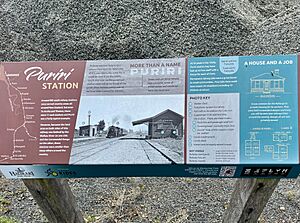Puriri, New Zealand facts for kids
Quick facts for kids
Puriri
|
|
|---|---|
| Country | New Zealand |
| Region | Waikato |
| District | Thames-Coromandel District |
| Ward | Thames ward |
| Community Board | Thames Community |
| Electorates |
|
| Area | |
| • Total | 1.00 km2 (0.39 sq mi) |
| Population
(June 2023)
|
|
| • Total | 260 |
| • Density | 260/km2 (673/sq mi) |
Puriri is a small place located on the Hauraki Plains in New Zealand. It is about 14 kilometers south-east of the town of Thames, New Zealand.
Puriri has a rich history. It was first a settlement for the Ngāti Maru people.
Early History and Missions
In October 1833, a missionary named Rev. Henry Williams visited Puriri. Soon after, missionaries from the Church Missionary Society (CMS) set up a mission station there. These missionaries included William Thomas Fairburn, John Alexander Wilson, John Morgan, and James Preece.
In 1835, James Stack was put in charge of the Puriri mission. However, the missionaries had to leave that same year because of fighting in the Waikato area. After the fighting stopped, Fairburn came back to the mission. James Preece took over the mission in 1834, with help from Rev. James Hamlin. In 1838, the mission station moved to Parawai, which is now part of Thames.
Gold Rush and Railway
In 1868, Puriri became an official goldfield. This happened during the exciting Thames-Coromandel gold rush. Many people came to the area hoping to find gold.
The Puriri railway station used to be west of the village. It was about 59.54 kilometers from Morrinsville. The station was open from 1898 until 1951. Today, the old railway line is part of the Hauraki Rail Trail, a popular path for walking and cycling.
People of Puriri
Statistics New Zealand describes Puriri as a rural settlement. It covers an area of 1.00 square kilometer. In 2018, the estimated population was 234 people. This means there were about 234 people living in each square kilometer. Puriri is part of a larger area called Matatoki-Puriri.
The population of Puriri has changed over the years.
- In 2006, there were 222 people.
- In 2013, the population was 204.
- By 2018, it had grown to 234 people.
This was an increase of 30 people since 2013. In 2018, there were 87 households in Puriri. There were 114 males and 123 females. The average age of people in Puriri was 41.6 years. About 23% of the people were under 15 years old.
Most people in Puriri are of European/Pākehā background (92.3%). Some people also identify as Māori (19.2%). A small number are Pacific peoples or other ethnicities. People can identify with more than one ethnic group.
When asked about religion, 59% of people said they had no religion. About 29.5% were Christian.
Education in Puriri
Puriri School is a school for students in years 1 to 8. It is a coeducational school, meaning both boys and girls attend. The school has a roll of 31 students. In 1961, the school celebrated its 80th anniversary. Later, in 2003, it celebrated its 125th anniversary. There was an even older school called Puriri School that existed in 1837.
 | James Van Der Zee |
 | Alma Thomas |
 | Ellis Wilson |
 | Margaret Taylor-Burroughs |


